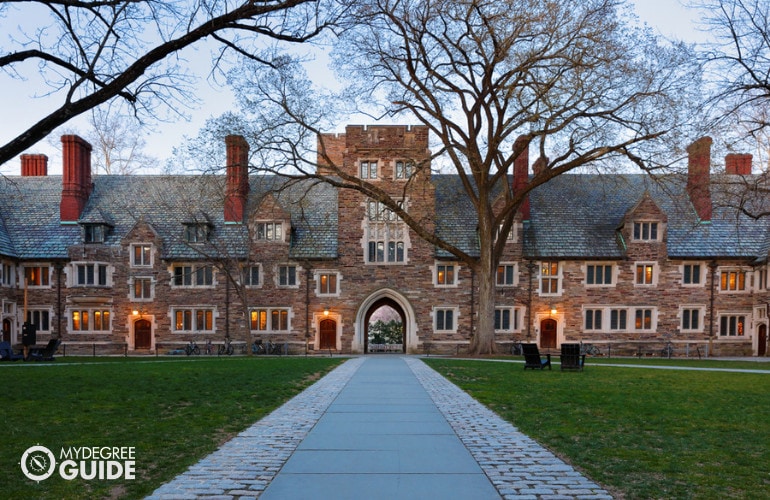An accelerated sociology degree online program can help you make sense of how society and culture work, and with an accelerated program you could potentially finish your degree in just 18-24 months.

Sociology programs explore the mystery of how human experiences and issues shape society. In your sociology degree program, you might look deep into the ancient past of humanity and travel through the present evolution of society.
You’ll likely explore topics like love, religion, identity, morality, gender, race, family, prejudice, discrimination, poverty, war, peace, education, and economics all swirl together to create what we know as society.
Editorial Listing ShortCode:
Types of Accelerated Sociology Degree Programs
Typically, if you take a sociology program at the undergraduate level, you will be working on a Bachelor’s of Sociology or a Bachelor’s of Arts in Sociology.
Possible concentrations you might be able to add to your degree are:
- Social Theory
- Social Research
- Ethnography
- Crime and Punishment
- Social Welfare
- Environmental Sociology
You could also take a generalist’s track and fill your electives with a collection of classes that interest you but don’t necessarily fall into one category.
Accelerated Sociology Degree Programs Overview

Along with developing students’ knowledge of human behavior, social organization, culture, and social change, sociology degree programs can help develop other skills that are beneficial in many careers.
They are famous for producing students with an appreciation of diversity, love of learning, and writing and research skills.
Studying sociology is about learning skills that you may apply to many job situations, not about preparing for a specific job. Sociology is a good major if you want to analyze sociological issues and propose solutions and improvements.
You can learn how to change the world instead of complaining about it! You can do this through inspiring classes, such as:
- Social Problems
- Contemporary Race-Ethnic Relations
- Global Environmental Issues
- Introduction to Criminal Justice
- Forensic Anthropology
- Computer Methods in Sociology
- Population, Natural Resources, and Environment
- Soil, Environment, and Society
- Environmental Justice
- Food Justice
- Community Dynamics and Development
- Gender and Society
There are classes looking at how society is impacted by leisure, sports, health, medicine, and law enforcement. Sociology courses often are full of fascinating material and cover topics relevant to your interactions in everyday life.
What Can I Do with a Degree in Sociology?

Getting a sociology degree does not mean you have to become a sociologist. You may take your degree in many different directions.
A bachelor’s degree in sociology can help open the door to a career in
- Teaching
- Journalism
- Human resources
- Marketing
- Research
- Publishing
- Non-profit work
- Consulting
- Program management
- Social work
- Counseling
- Community development
- Probation and prison service
- Politics
- Law
- Media
To get the title of “sociologist,” you would have to continue on with a master’s degree or PhD. Many careers pursued by those with a sociology degree require further education or on-the-job training.
Since the career opportunities with a sociology degree are so varied, the salary possibilities are quite varied as well. According to the Bureau of Labor Statistics, these are the average salaries for some of the careers that sociology degree holders pursue:
| Career | Annual Median Salary |
| Political Scientists | $125,350 |
| Public Relations Managers | $118,430 |
| Sociologists | $86,110 |
| Postsecondary Teachers | $80,790 |
| Urban Planners | $75,950 |
| Social and Community Service Managers | $69,600 |
| Social Workers | $51,760 |
| Mental Health Counselors | $47,660 |
Earning your sociology degree can help you develop a set of skills that is valuable to many employers from many different fields.
James Blunt, the pop sensation of 2005 who wrote the iconic song “You’re Beautiful,” graduated with a degree in sociology from the University of Bristol. He said his degree in sociology was useful for songwriting because the “way humans interact, the way we are as social beings, those topics are kind of relevant.”
Why Enroll in an Accelerated Sociology Degree Program?

A sociology degree program does not have to follow the traditional course schedule or timing. You may be able to earn your degree in a way that works better for you by taking an accelerated sociology degree program.
There are many potential benefits to taking an online, accelerated program.
Start Now!
Instead of waiting until next semester to start, you may apply to one of the many universities that offer start dates every month. The sooner you get started, the closer you’ll be to starting a career in your chosen field.
Editorial Listing ShortCode:
Finish Faster!
A traditional on-campus class is 16 weeks long, but you may be able to complete the same class material in an accelerated class and be done in just 6-8 weeks. There is no difference in how the class appears on your transcript.
Control Your Schedule!
Many online courses have no set schedule. This means you do your schoolwork when it is convenient for you and plan it around your schedule. You also don’t have to commute to school, so you can work from home, your local coffee shop, or wherever you feel the most comfortable.
3 Ways to Accelerate Your Sociology Degree Even More
Taking 4 years to complete a bachelor’s degree is not always a necessity. That is just a societal norm.
These 3 tips can help you complete your degree in less time. You might even be able to complete it in half the time it would typically take.
1. Test Out of College Classes (Up to 1 Year)
Taking college classes to get college credits is not the only way to earn your degree. Many schools will accept credits earned through a program called the College Level Examination Program (CLEP).
In this program, you pay a flat fee of $89 (plus any test center fees), purchase a study guide if you need to prepare, and then take a 90-minute, 100-question exam for the class you want to test out of. If you get 50% of the questions right, you’ll pass and earn the credits (usually 3) for that class.
Many colleges will allow you to earn up to 30 credits in this way, which is the equivalent of one year of college in a traditional program!
2. Get College Credit for Your Life and Work Experience (Up to 1 Semester)
What work and life experiences have you had already? There may be ways you can receive credit for what you have already accomplished. You can talk to your school advisor about applying to earn credit for prior learning.
You could potentially earn credit for:
- on-the-job training
- overseas or volunteer work
- a course that you took at work
- military service
Most universities will grant up to 15 credits for qualifying experiences, which is equivalent to a semester’s worth of classes in a traditional program.
3. Stay Continuously Enrolled with the Max Course Load
Most students take 15 credits per semester, in the fall and in the spring, and earn 30 credits a year. You don’t have to work at that pace.
Instead, you may take the maximum course load your university will allow. That is usually 18 credits each semester. If you add in taking a full course load over the summer, you might be able to earn 54 credits in just 12 months.
This pace could potentially cut your completion time in half.
Bonus: Transferring Your Existing College Credits
If you completed classes from another accredited college, then it makes sense to use it. There are a few stipulations you may need to check first:
- The credit came from an accredited college
- You earned at least a C in the class
- The class fits into your sociology degree
Even if your class doesn’t fit into your sociology degree, you may still be able to transfer the credits in to fill an elective spot.
Lower Tuition Costs

Like most bachelor’s degrees, a sociology degree typically requires earning at least 120 credits. Tuition for all of those credits can add up. One of the best ways to save money is to earn those credits by exam or for prior learning instead of taking the classes.
For the courses you do need to take, you may cut your expenses by taking advantage of financial aid.
By filling out the Free Application for Federal Student Aid (FAFSA), you can see what the government can offer you in terms of grants and low-interest loans.
Grants do not need to be repaid as long as they aren’t used incorrectly. Loans you will have to repay after you graduate.
You can also look into:
- State funds
- University scholarships
- Scholarships from private businesses or organizations
- Employer assistance programs
It might take some time to apply for financial aid, but any money you receive can help you reduce the cost of getting your degree.
Sociology Degree Accreditation

Accreditation certifies that the school you are attending is teaching according to the highest standards. It is what makes your degree valid in the eyes of other universities and employers.
You’ll want to check to see if your university has accreditation from one of these regional boards:
- Higher Learning Commission (HLC)
- Middle States Commission on Higher Education (MSCHE)
- New England Commission of Higher Education (NECHE)
- Northwest Commission on Colleges and Universities (NWCCU)
- Southern Association of Colleges and Schools Commission on Colleges (SACSCOC)
- WASC Senior College and University Commission (WSCUC)
You can also look for specific programmatic accreditation, which is a sign that your specific sociology program is meeting high standards. Two programmatic accreditations to look for are:
- The Commission on the Accreditation of Programs in Applied and Clinical Sociology (CAPACS)
- Association for Applied and Clinical Sociology
Accreditation can help give you the assurance that your degree is worthwhile and will be recognized by other schools and future employers.
Can You Get a Sociology Degree Online?

Yes, a sociology degree can be earned online. Online programs are becoming more popular with students because of their flexibility, and many universities are answering the demand.
While sociology isn’t the most popular major, there are still many universities offering online sociology programs.
How Much Does a Sociology Degree Cost?
The range for a bachelor’s degree in sociology goes from $30,000 to over $175,000. It all depends on which college you go to. In-state colleges might be less expensive than out-of-state schools. Public universities are generally less expensive than private ones.
You may be able to lower your costs by earning credit by exam and credit through prior learning. Taking online classes may also lower your expenses because you won’t be paying for room and board or commuting costs.
What Masters Degree Can You Get with a Bachelor’s in Sociology?
While it depends on the university you want to attend and your personal career goals and interests, these master degrees are often good next steps after earning a bachelor’s in sociology:
- Master of Sociology
- Master of Social Work (MSW)
- Master of Education
- Master of Criminal Justice
- Master of Marketing
- Master of Organizational Leadership
- Master of Political Science
- Master of Psychology
- Master of Public Administration
- Master of Public Health
These are just some of the master’s degrees that sociology graduates pursue. You may be able to pursue other degrees that fit your interests as well.
Admissions requirements vary from program to program, but a bachelor’s in sociology may apply to many of them. You can check the admissions requirements for the master’s program you’re interested in by checking their website or contacting their admissions department.
Get Started Now and Finish Faster than You Thought!

An online accelerated sociology degree may allow you to complete your classes and gain the knowledge you need in half the time as an on-campus program.
If you earn credit by exam and credits through a portfolio of prior learning, you might be able to finish your sociology degree in just 18 months and save yourself thousands of dollars.

